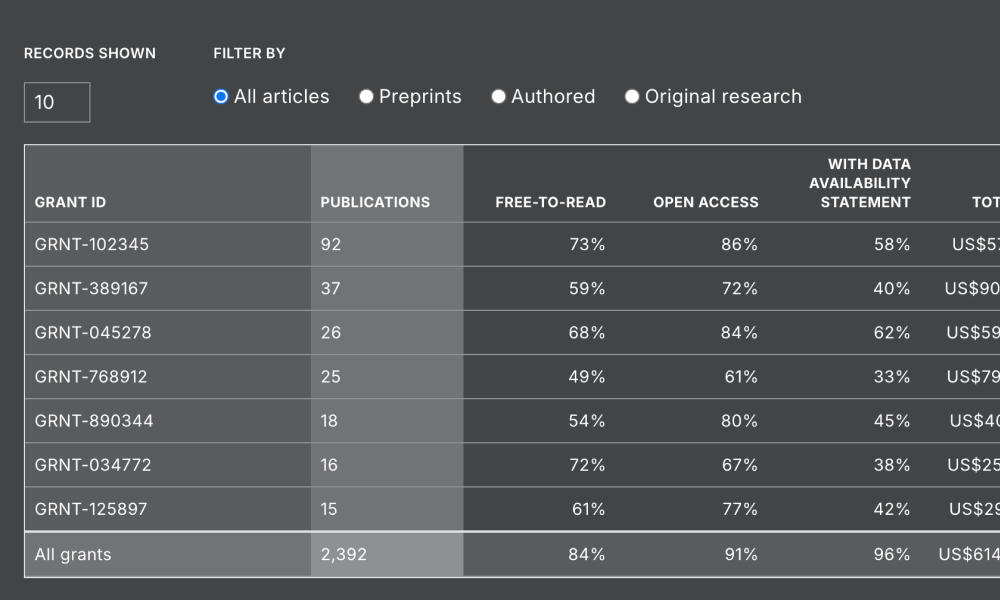OA.Works turns 12 🎂
Turning policy into practice, ideas into impact, and the email that started it all.
Twelve years ago, a 2 a.m. email kickstarted the Open Access Button, OA.Work’s first scrappy attempt at making Open Access easier and more equitable. To mark this milestone, I wanted to share some of what we’re celebrating on this birthday, including some of the team’s recent achievements, where we are today, and the fact that our days now end at more humane hours… though my newborn hasn’t quite received the memo yet.

Right now, OA.Works’ focus is on making it easy to put Open Access policies into practice by using OA.Report to streamline compliance checking and follow-ups. Some of my personal highlights include:
- Helping funders track their impact and advance openness. It’s been a joy to support missions close to my heart through collaborations with Canada’s International Development Research Centre (IDRC), the Michael J. Fox Foundation’s Parkinson's Progression Markers Initiative (PPMI), UK Research and Innovation (UKRI), and the Open Climate Campaign. Together, we’re helping these organizations identify the research they’ve funded, understand how open it is, and take meaningful steps to make it even more accessible. The preprint Investing in Open Science: Key Considerations for Funders highlights one way OA.Report supports funders.
- Scaling up to support cOAlition S. We supported their impact tracking and delivered compliance checks across all member organizations. This was a big lift for our team, and I’m proud of them for nailing it! Their blog post Are open bibliometric data sources better than proprietary ones? (spoiler: yes, they are) showcases just how strong Open Data sources have become in recent years.
- Strengthening OA.Report’s backbone of “Open Data, your data, and our data”. As OpenAlex improves, we’re using more of its data, enriching it with 150,000+ manually collected data points, 78 custom user datasets, and cleaned data that’s difficult to quantify but continues to grow. We’ve found this to be a powerful cocktail to get Open Data the “last mile” for solving problems, so it’s been exciting to see our approach mature and scale.
- Bringing clarity and purpose to OA.Report. It’s been incredibly rewarding to see how our team keeps shaping and refining it to meet real needs. We’ve incrementally improved OA.Report’s design to make it much easier to dig into how open your research is, and, as AI-skeptics, we found a home for generative AI in cleaning up messy data (especially grants data). Finally, we’ve overhauled our homepage to help people better understand what we offer and how we can help.
The updated OA.Report homepage now better explains how we support Open Access compliance.
Alongside OA.Report, our work has also had an impact on self-archiving, interlibrary loans, and persistent identifiers (PIDs):
- We made it simpler to integrate ShareYourPaper with repositories and made a few other refinements to continue making self-archiving easy.
- We hit a major milestone when ShareYourPaper Permissions’ integration with the Journal Checker Tool reached 1 million searches since its launch. And that number is quickly rising, with 3,000 unique monthly users. I remember building out the first version of the permissions system over a Christmas break seven years ago– it has come so far!
- We’re persistent identifier nerds and our work on OA.Report has us knee-deep in the world of messy grant data. In the long term, grant DOIs are an excellent solution, but they’re tricky for funders to create. So we’ve made it easier for them by building an open-source integration with the grant management system Fluxx, which is used by hundreds of funders. This was a great proof of concept, and we’re thrilled that Crossref has now taken up the work to support more of the many other grant management systems out there.
- We wished our partners at IFLA good luck as they took over the long-term running of RSCVD, a free international interlibrary loan (ILL) system that we jump-started overnight during the pandemic.

Today, these achievements are powered not by 2 a.m. emails but by a team of experts from around the world, governed by our Advisory Committee, and supported by a growing list of organizations:
- In 2024, our team grew, and you could find us working from the USA, UK, India, and New Zealand, which meant that someone, somewhere, was hard at work advancing our mission 24 hours a day.
- Our Advisory Committee has continued to carry out the quiet, careful work of governance. In 2024, it achieved many “firsts,” including our first new arrival, Denisse Albornoz, and our first departure, Tina Baich. We thank them both for their service.
- We are grateful to have received additional funding for our work from the Gates Foundation, the Robert Wood Johnson Foundation, and Founders Pledge.
It feels like a tough time to celebrate anything at the moment, as trusted research that serves the public interest comes under increasing threat. But at OA.Works, we’re proud to play our part by ensuring that access to knowledge is never limited by cost or complexity, allowing the researchers, policymakers, and communities who need it most to benefit from it. Thank you to our team, our Advisory Committee, our users and funders, and our broader community for the chance to still be doing this twelve years later.
We have lots in store for our thirteenth year. If you’d like to hear about it, sign up for our newsletter.
Support for this work was provided in part by the Gates Foundation, the Robert Wood Johnson Foundation, and Arcadia. The views expressed here do not necessarily reflect the views of our funders.

